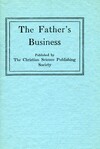

Are you sure?
This bookmark will be removed from all folders and any saved notes will be permanently removed.
The abundance of God
Originally published in the February 1, 1911 issue of The Christian Science Monitor
When Jesus said, “Take no thought for your life, what ye shall eat, or what ye shall drink; nor yet for your body, what ye shall put on,” he reminded his hearers that God is able to feed and clothe man as He does the lilies and the birds. Such a concept of the divine power as this is very far from the present human sense of things; and even the Bible says that the need to earn his bread in the sweat of his brow was the curse laid upon Adam. But certainly the teachings of Jesus and his example would seem to point to God as the source of man’s supply, rather than man’s own effort.
How may this ideal of God’s ability and willingness to provide everything for His child be reconciled with the very practical demands of our every-day life? Christian Science comes to reconcile these seeming divergent calls of the divine ideal and of the workaday material. It shows first of all that our external conditions are not what govern us, but our own thinking. Outward things reflect more or less definitely our own habits of thought and those deep-laid convictions of mortal mind which are the heritage, as it appears, of all humanity. If we believe in plenty, we shall see plenty all around us,—that is, if our belief or faith in plenty is well founded. A belief in plenty which is founded in a material sense of things is likely to be suddenly reversed, making poverty appear where riches were. But if our faith in the abundance of the divine good, in God as infinitely creative might, as limitless resource, is our deepest conviction on this subject of supply, we shall unfailingly see plenty in our outward conditions.
The human sense of lack, voiced everywhere today in the universal complaint over the high cost of foodstuffs and other necessaries of living, must be met in thought as an error to be corrected, before the abundance of good which Jesus affirmed can be manifested.
Enjoy 1 free Sentinel article or audio program each month, including content from 1898 to today.
JSH Collections
This article is included in:
1913 - PAMPHLET
The Father’s business
JSH-Online has hundreds of pamphlets, anthologies, and special editions for you to discover.


